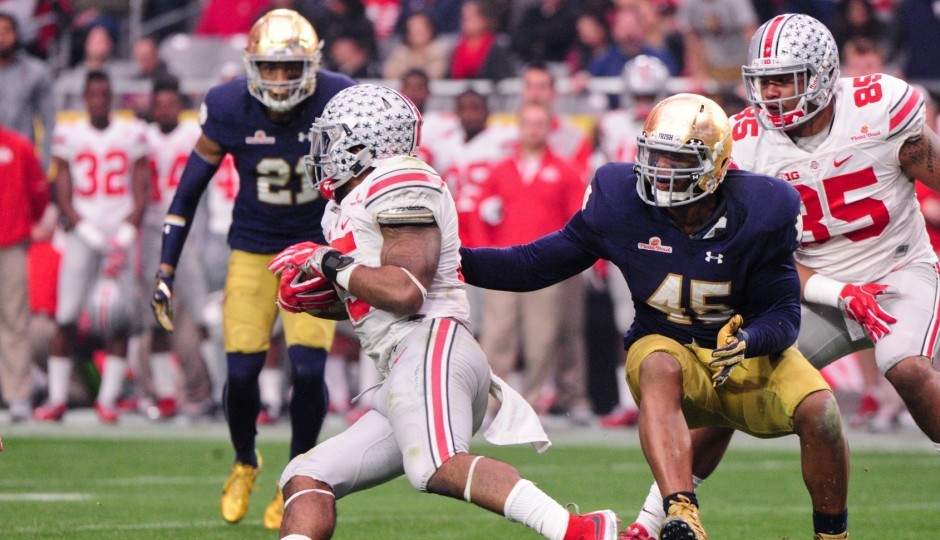On Elliott And the Value Of Running Back
How high is too high to draft a running back?
If you asked Eagles executive vice president of football operations Howie Roseman, he’d tell you: it depends.
“There’s this narrative that you can get running backs in the fifth, sixth, seventh round of the draft and free agency,” Roseman said last Monday at the NFL owners meetings in Boca Raton, “but when you look back at the last 10 years, guys who were really in the top 10 in rushing, those guys are high picks.”
Roseman’s statement appears to run counter to an opinion growing in league circles the last few years–namely that you can find a running back virtually anywhere.
Just last year Chris Ivory, who went undrafted out of Tiffin University, ranked fifth in rushing with 1,070 yards. Latavius Murray, who rushed for 1,066 yards, was drafted in the sixth round. Devonta Freeman, who set the league on fire early last year, went in the fourth.
Familiar faces in the NFC East–Rashad Jennings and Alfred Morris–went in the seventh and sixth rounds respectively.
Even standouts like Arian Foster and Priest Holmes went undrafted.
This all begs the question: if you can find a productive back in the latter rounds or on the street, why spend a high pick on one? That’s something Roseman and the Eagles will undoubtedly consider as they weigh the pros and cons of selecting Ohio State running back Ezekiel Elliott at No. 8.
Roseman isn’t going to let slip whether the Eagles have interest in any specific player or not, but it’s at least interesting that he disagreed with the devaluing of the running back position when it comes to the draft.
“…when you find a special talent at that position, that guy who can run the ball, who can pass-protect, who can catch the ball out of the backfield, that’s a unique weapon.”
The dichotomy of opinion is clear.
On one side you have the aforementioned theory, that a running back should not be valued equally with other positions because of its depth of quality at the position in the draft. This theory rests on the assumption that running back is one of the easier positions at which college players can immediately produce, and that a player who went overlooked by scouts–for whatever reason–can come in and plausibly produce just as much as a high-profile college rusher might.
On the other side you have the argument that Roseman put forth.
“…there’s a difference between a special player and a role player at that position… when you’re talking about the guys who are 1,500-yard rushers, the guys people are game-planning [for], those are hard to get later in the draft.”
Another look at last year’s leading rushers seems to support Roseman. The top four leading rushers from last year–Adrian Peterson, Doug Martin, Todd Gurley, and Darren McFadden–were all taken in the first rounds of their respective drafts. Previous league-leaders like LeSean McCoy and DeMarco Murray were taken in the second and third rounds.
Teams have to determine whether Elliott is worth the investment. Many analysts have him as a top-10 pick (Elliott to the Eagles at 8 is a popular prediction). NFL.com draft expert Daniel Jeremiah has him as the sixth-ranked prospect overall. Here is what Jeremiah has to say about Elliott.
Elliott was a two-year starter at running back for the Buckeyes. He has ideal size, quickness and toughness for the position. On inside runs, he has excellent vision, balance and power. He is quick to press the hole and he has the lateral quickness to avoid defenders in tight quarters. He will bounce outside when needed but he likes to stay north and south. On outside runs, he has a burst to the edge and he has home-run speed to go the distance once he turns the corner. He is outstanding in the passing game, showing soft hands out of the backfield and a willingness to chest up blitzing linebackers. Overall, there is very little not to like about Elliott. He should be an immediate-impact player on all three downs.
The key phrase here is impact player.
Impact, ultimately, is something NFL personnel heads (like Roseman) tend to value, high cost or not.
Elliott is not the only option. Possible impact rushers like Alabama’s Derrick Henry and Louisiana Tech’s Kenneth Dixon could be available to the Eagles when they make their two third-round selections (77th and 79th, overall) on Friday, April 29th.
Henry, the 2o15 Heisman Trophy winner, opened some eyes at this year’s combine when he ran the 40-yard dash in 4.54 seconds… at 247 pounds (10 pounds heavier than Panthers middle linebacker Luke Kuechly).
The lesser-known Dixon had 26 total touchdowns for Louisiana Tech in the 2015 season alone (19 rushing, 7 receiving), all despite missing two games with an ankle injury. He held the record for most touchdowns in FBS history for a few days before being beat out by Navy quarterback Keenan Reynolds in Reynolds’ final game.
https://www.youtube.com/watch?v=h0lVpkJe0TM
Players like Dixon and Henry offer the Eagles viable options in the mid-rounds if they wish to select other top prospects with the eighth overall pick. Despite Roseman’s position that elite running backs still have great value, perhaps the Eagles will wish to lock down one side of their defensive backfield by drafting cornerback Vernon Hargreaves III, or find their future quarterback in a Jared Goff or Carson Wentz.
With an aging running back corps whose number one rusher, Ryan Mathews, has recorded only one full season in his six total in the NFL, one thing is sure: the Eagles will address the position at some point in the draft or subsequent free agency.
The only question is, when?
